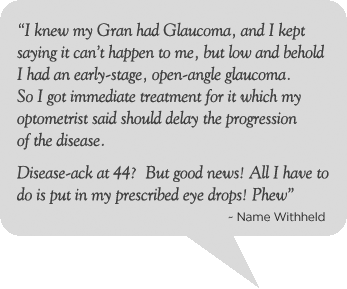What is Glaucoma exactly?
 It's often associated with a buildup of pressure inside the eye. Glaucoma tends to be inherited and you should get yourself checked if others in your family have been diagnosed with this disorder. Over time, glaucoma will cause permanent loss of vision and without treatment, glaucoma can cause total permanent blindness within a few years.
It's often associated with a buildup of pressure inside the eye. Glaucoma tends to be inherited and you should get yourself checked if others in your family have been diagnosed with this disorder. Over time, glaucoma will cause permanent loss of vision and without treatment, glaucoma can cause total permanent blindness within a few years.
Are you at high risk for Glaucoma?
- If you are over the age of 40 and if you have a family history of glaucoma.
- GRF recommends that African-Americans get a thorough check for glaucoma every one to two years after age 35.
- Talk to family members about glaucoma. If family members have glaucoma, then your glaucoma risk is increased.
- If you have diabetes or high blood pressure.
- Hispanic Americans in older age groups are also at greater risk for glaucoma.
- Steroid Users - adults who require approximately 14 to 35 puffs of steroid inhaler to control asthma have an increased incidence of glaucoma.
- Eye Injury - Injury to the eye may cause secondary open-angle glaucoma. This type of glaucoma can occur immediately after the injury or years later.
Maybe you need a Glaucoma Test?
What is a Glaucoma test? Glaucoma testing involves measuring internal eye pressure and a detailed scan of the retina for signs of disease.
- Only a comprehensive eye exam can reveal whether or not you have glaucoma.
- Increased pressure inside the eye is often a key indicator of glaucoma, though not exclusively so.
 Eye doctors can use a number of tests for eye pressure but will, by default, check for signs of glaucoma as part of a detailed exam
Eye doctors can use a number of tests for eye pressure but will, by default, check for signs of glaucoma as part of a detailed exam- An examination of the retina—the light sensitive area at the back of the eye responsible for processing images is only the true way you will know you have Glaucoma.
How Does Glaucoma Testing Work?
There are two types of Glaucoma tests that measure the internal pressure of the eye but one is much more accurate than the other.
One glaucoma test involves measuring what happens when a puff of air is blown across the surface of the eye. (A puff test) Another test uses a special device (in conjunction with eye-numbing drops) to “touch” the surface of the eye to measure eye pressure.
While increased eye pressure is a key indicator of the disease, it does not necessarily mean you have a glaucoma diagnosis. In fact, the only way to detect glaucoma is to have a detailed, comprehensive eye exam that often includes dilation of the pupils.
So “true” glaucoma testing actually involves examining the retina and optic nerve at the back of the eye for signs of the disease.
Learn More
Glaucoma can cause slight to severe vision loss, and is often discovered only after the disease is present—that’s why glaucoma testing is so important.
Special thanks to the EyeGlass Guide for informational material that aided in the creation of this website. Visit the EyeGlass Guide today!


Holiday Hours May Vary